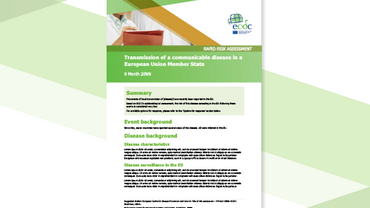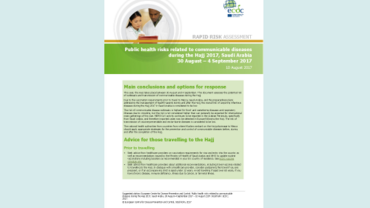Rapid Risk Assessment: Severe respiratory disease associated with Middle East respiratory syndrome coronavirus (MERS-CoV)
Due to the substantial increase of Middle East respiratory syndrome coronavirus cases in the past month (108 cases between the 13 and 23 April), a ninth update to the rapid risk assessment on severe respiratory disease associated with MERS-CoV is published today.
Executive Summary
A marked and sudden increase in the number of Middle East respiratory syndrome coronavirus (MERS-CoV) cases have been reported in April 2014. The majority of cases continue to be in Saudi Arabia and the Arabian Peninsula but earlier this month a confirmed case in Greece brought the total number of EU affected countries to five (France, Germany, Italy and the UK the other four). Given the current epidemiology, it is likely that more cases will be imported to the EU. ECDC’s latest Rapid Risk Assessment update does not alter the earlier conclusion that the risk of MERS-CoV infection for Europeans visiting or residing in the region is low, and secondary transmission in the EU from imported cases is low.
This outbreak has had a serious public health impact in the region and has the potential to spread and have an impact on a wider geographic region, if the virus is transmitting among humans.
The cause of the rapid increase in cases is unknown. The Rapid Risk Assessment considers the possible scenarios that might explain this, notably:
- More sensitive case detection through more active case finding and contact tracing or changes in testing algorithms,
- Increased zoonotic transmission with subsequent transmission in healthcare settings,
- Breakdown in infection control measures or otherwise increased transmission in the local healthcare setting,
- Change in the virus resulting in more effective human-to-human transmission, resulting in both nosocomial clusters, and increased numbers of asymptomatic community acquired cases, or
- False positive lab results.
ECDC suggests that the international public health community could provide support for an outbreak assessment to minimise the possibility of widespread human-to-human transmission in the community as well as observational clinical studies to determine optimal management of patients in order to improve outcomes. The recommendations from previous Rapid Risk Assessments, notably from 24 September 2013, remain valid.
As of 23 April 2014, 345 laboratory-confirmed cases of MERS-CoV have been reported to public health authorities worldwide, including 107 deaths. Fourteen countries have identified cases; four of which have only reported one case, whilst 272 cases have been in Saudi Arabia. Seventy-two of the 345 cases have been healthcare workers.







